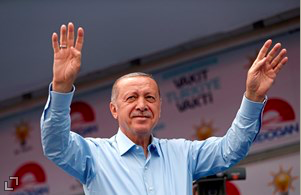Comments by Hüseyin Çiçek: From a weak democracy to a personalized autocracy
Dr. Hüseyin Çiçek, political scientist and research associate at EZIRE, comments on the political power of Turkish President Erdoğan and whether he will try to unite the ultra-right parties MHP and Iyi Parti at Startart.at. The challenges of the Turkish political system with democracy are by no means new, but it is necessary to illuminate what President Erdoğan has achieved, so that the current developments will not be classified as system weaknesses of a second-degree democracy.
In the Present, the Turkish president unites all power and holds state-subsidized offices, which he exercises without restriction. The presidential system allows Erdoğan to completely outsource the “checks and balances” that are important for a democracy. By doing this, he can ad libitum exercise power and arbitrariness, as it happened intensively in the past months and weeks. Important positions within the judiciary and the military were filled with AKP sympathizers, and academic or civil society personalities who wanted to protect the aforementioned institutions from an anti-democratic takeover were already arrested by the hundreds.
Çiçek explains that Erdoğan’s political power differs from the power of his predecessors as he, more than anyone else, can make the political or social balance within society dependent on his personal worldviews. Today’s weak presence of an order system at international level opens up new scope for Erdoğan. For the success of his personalized autocracy however, the International is only of limited importance, rather it is the strategically well-considered domestic policy steps of the Turkish president, in the tradition of authoritarian (almost totalitarian) party leaders. With those steps, he could catapult formerly influential party founders or critics in the AKP into political Nirvana. Thus he is no longer “one among equals”, but rather the new political system of Turkey. In other words, looking for a critical voice in the AKP is like trying to breathe underwater at the moment.
For the opposition these are tough times. Even in the course of the election campaign, the personalized autocracy was to grab with hands – the opposition was prevented from appearing on public service television and radio and was thus prevented frommobilizing voters, private broadcasters entirely renounced to let Erdoğan’s political opposition appear in word or image. The aggravated electoral conditions in southeastern Turkey were legitimized as security measures, obstacles during the election and the innumerable allegations of electoral fraud were staged in advance by the AKP as planned oppositional strategies to deal with their impending political defeat. The new power will not benefit President Erdoğan to unite his country, divided by ethnic and political conflicts, but will rather lead to further escalation, so that all opposition to him will fail, according to Çiçek.
In the upcoming months it will be interesting whether Erdoğan makes an attempt to unite the two ultra-right parties MHP and Iyi Parti, which has split off from the former. The votes of both parties taken together account for 20 percent for the ultra right. Their political views with regard to minorities, human rights and democracy differ little from each other, for both there´s only a military solution to the Kurdish question, both are positive about military adventures in Syria and are by no means restrained when it comes to limiting citizens’ rights or weakening democratic institutions in the security interest of the state . The economic challenges would only partially restrain Erdoğan in his personalized political, autocratic agenda, but he could now realize his idea of domination by even more arbitrary, puzzling or threatening action and distract from real political abyss, Çiçek comments.
